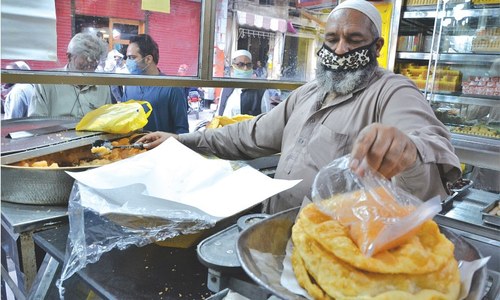Food opinions are generally one thing that Pakistanis can agree on unless of course you are a monster who doesn’t like nihari.
But over the past week, things took an ugly turn when several restaurants in Karachi went public against Foodpanda and shut themselves off its app temporarily.
Brands under the banner of the All Pakistan Restaurants Association (Apra) announced a three-day boycott of Foodpanda (Sept 15-17), decrying its ‘unfair’ policies. If no solution is reached, they said, they “will be left with no option than to close the services permanently nationwide”.
In a letter dated Sept 14 to Foodpanda CEO Noman Sikander Mirza, Apra pointed out primarily three grievances on behalf of its members. First was the issue of vendor delivery services, which the aggregator has been trying to end in order to make way for its own rider network to become responsible for all logistical operations.
The second issue relates to the commission rates, which they said Foodpanda has been pressuring the restaurants to push up — by as much as seven percentage points for example — and demanded a cap on that. Lastly, the aggregator’s practice to ask vendors for exclusivity clauses was mentioned, which they said is anti-competitive.
The issue of vendor delivery services — which Foodpanda has been trying to end to ensure its own rider network controls full logistical operations — is at the centre of the restaurants’ fight with the aggregator
The conflict had been brewing for a long time now. According to Farooq Mamsa, chief operating officer of upscale cafe Espresso, there had been issues between the restaurants and Foodpanda before but those would be settled amicably. However, this time the latter took a much tougher stance and instead gave an ultimatum. It asked restaurants to end their own delivery services and use the app’s fleet instead.
“When we started out with Foodpanda, it was simply them redirecting orders to us, which were then delivered by our fleet. Eventually, they built their own network and we adopted a hybrid model,” says Kaybees Director Danish Feroz Kalia.
“Around the time of lockdown, they first said we could no longer do deliveries ourselves. But due to the situation then, it died down only to return with the same condition after things improved and threatened to shut off in case of non-compliance,” he adds.
Some might be wondering what’s even the big deal about deliveries? Well, mighty big. “There is a major difference between our riders and theirs in terms of standard operating procedures, training etc. For example, when delivering cold beverages, we have ice boxes while they don’t,” explains Mr Mamsa.
Even in terms of distances covered, there is a significant difference as Foodpanda has a radius limit of 4km for deliveries fulfilled through its riders while restaurants can go even up to 10km or more.
As far as commissions are concerned, there is a wide range of rates, depending on the individual restaurant’s bargaining power and can vary from as low as eight per cent for a multinational chain to even upwards of 35pc for smaller eateries.
While not mentioned in the original letter, Apra members, including its convenor Athar Chawla, also protested that Foodpanda doesn’t give them access to their own data (for example, on customer feedback) for orders delivered through its own network.
In another letter to the Competition Commission of Pakistan (CCP), Apra complained about Foodpanda’s exclusivity clauses, terming it a misuse of dominant position. This wasn’t the first time the matter had landed with the antitrust watchdog either. In August 2019, Careem that also operates in the food vertical had taken up the same issue and an inquiry was held in this regard.
The issue pertained to Foodpanda having an exemption from the CCP to pursue exclusive contracts with vendors who on completion of a given duration get a loyalty bonus. The former didn’t find this arrangement anti-competitive though, two people familiar with the inquiry told Dawn.
“Predatory business practices like signing exclusivity, preventing customers from doing business with other aggregators and forcing customers to forego building their own delivery infrastructure are anti-competitive and harm consumers over the long term. These practices are designed to create monopolistic market positions and earn extraordinary profits over time.
“It is, therefore, no surprise that in markets with only one aggregator restaurant commissions are greater than 40pc. In markets with two, they are closer to 25pc. In markets with three or more, they are below 14pc. These commission rates will eventually be passed on to consumers. Competition works to reduce consumer prices and the food delivery space in Pakistan is no exception to basic laws of economics,” a statement from Cheetay said.
Unlike more developed app-based delivery ecosystems where three to four players operate, Pakistan’s landscape has Foodpanda on the very top with well above 50pc market share. While in Punjab’s cities, Cheetay has still gained the position of a somewhat distant second, the dynamics in Karachi and Hyderabad give Foodpanda immense power to call the shots. Attempts by the likes of EatMubarak didn’t pan out as planned while Careem is still limited to certain neighbourhoods such as hubs around Sindhi Muslim or DHA.
Trying to make the most of this situation, Careem Pakistan CEO Zeeshan Haseeb Baig wrote an open letter to restaurant owners, offering them commission rates within the range of 15-20pc and stressing on mutual consent as the basis of any agreement. Though there was no mention of Foodpanda, he talked against exclusive contracts and even promised an undisclosed package for Apra members.
Whether this confrontation would help bring competition to the local delivery industry remains to be seen. But in the meanwhile, there have already been reports of Foodpanda shutting off some of the restaurants that took part in the boycott. A list seen by Dawn mentions over 20 such eateries. If anything, the situation is only going to escalate as the restaurant association in Lahore has also expressed its grievances while Islamabad-based players are expected to issue one soon.
Despite multiple attempts at reaching Foodpanda through a number of channels, there was no response.
Published in Dawn, The Business and Finance Weekly, September 21st, 2020














































